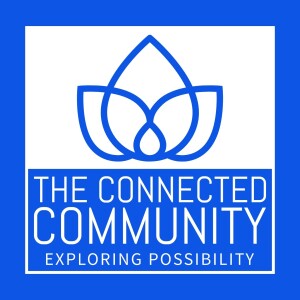
Thursday Nov 14, 2024
Understanding Codependency and People Pleasing
In this episode of The Connected Community Podcast, host Nicky Yazbeck sits down with Amber Tolbert, a Licensed Clinical Social Worker, experiential psychotherapy practitioner, and energy healer trained in Holy Fire Reiki. Amber is also the founder of The Healing Collective, and she shares her expertise on the complexities of codependency, discussing how it often stems from generational trauma and manifests in various types of relationships. Together, Nicky and Amber explore the differences between empathy and codependency, the importance of self-awareness, and the role of emotional health in fostering independence and healthier connections.
The conversation dives into parent-child dynamics, touching on how survival states, shame, and guilt can impact personal growth and relationships. Amber explains the process of reparenting oneself with compassion and breaking cycles of dysfunction, emphasizing that healing and recovery are lifelong journeys. With her background in experiential psychotherapy and energy healing, Amber brings a holistic perspective to the discussion, offering valuable insights into emotional awareness, creating new patterns, and fostering self-acceptance in the pursuit of balanced and fulfilling relationships.
Takeaways:
- Codependency is often rooted in generational trauma.
- Empowerment is key to healing from codependency.
- Codependency can manifest in various relationships, not just romantic ones.
- All or nothing thinking is a sign of codependency.
- Understanding the intention behind codependency can aid in healing.
- Self-awareness is crucial in identifying codependent behaviors.
- Empathy is different from codependency; it's about responsibility for others' feelings.
- Healing requires a supportive community and connection.
- Children can be naturally empathic, which can lead to codependent dynamics.
- Recovery involves finding balance and self-acceptance. Expressing feelings teaches children how to feel.
- It's unrealistic to expect to be okay all the time.
- We recreate familiar patterns, not desired ones.
- Survival states hinder awareness and connection.
- Shame and guilt can trap us in negative cycles.
- Reparenting involves treating ourselves with compassion.
- Healing is a lifelong journey, not a quick fix.
- Building new neural pathways requires consistent effort.
- Emotional safety is crucial for healthy relationships.
- Recovery includes accepting all parts of ourselves.
Connect with me:
https://nickyYyoga.com
https://www.youtube.com/@TheConnectedCommunity
support@nickyYyoga.com
Connect with Amber:
https://www.the-healingcollective.com/
https://www.facebook.com/p/amber-tolbert-100005524728009/
https://www.ambertolbertconsulting.com/?fbclid=IwY2xjawGN8NJleHRuA2FlbQIxMAABHZkCpi9mQsBzIrnv0vhqYdX5K29-2CRiAMuZVPOpYpBdOOimatvoIok6Sw_aem_vHC5lfND1-C3ZFyOKOT8HQ
https://docs.google.com/forms/d/e/1FAIpQLSepb98RI-wgQ6op0jWqjOcQ55YLMhTZtSXd5wcYx7_qwTosNQ/viewform
Keywords:
codependency, relationships, healing, emotional health, trauma, self-awareness, empathy, family dynamics, mental health, recovery, parenting, emotional awareness, family dynamics, personal growth, dysfunction, relationships, shame, guilt, reparenting, recovery
No comments yet. Be the first to say something!